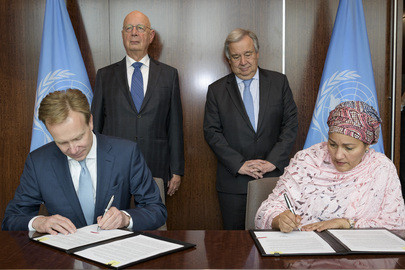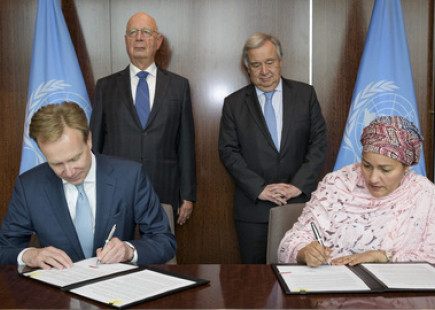UN signs deal with Davos that threatens democratic principles
Topics
A global corporate and government marriage took place last week – and governments and citizens were not even invited as guests.

Manuel Elias/UN photo
A global corporate and government marriage took place last week – and governments and citizens were not even invited as guests. The occasion was the signing of a memorandum of understanding between the corporate-led World Economic Forum (WEF) and the United Nations. The nuptial agreement commits the two institutions to unprecedented levels of cooperation and coordination in the fields of education, women, financing, climate change, and health.
At first glance, this agreement may sound entirely beneficial. Who can be opposed to progress or collaboration by any groups on critical social and environmental challenges? But the memorandum is not just about cooperation, but rather establishes an institutional home for multinational corporations inside the UN. There is no similar space in the UN system for civil society, for academics, for religious leaders, or for youth.
In its strong advocacy for a “multistakeholder” approach to global governance which demotes the primacy of states to make global decisions, it also marks a fundamental challenge to a nation-state global governance system that - despite its flaws - has clear obligations, responsibilities and liabilities.
There may have been two parties at the wedding, but the desire for marriage was most likely driven by the World Economic Forum. WEF has become famous for its glitzy annual gatherings in Davos, Switzerland to which corporate executives and a smattering of celebrities fly in via private jet every January. Through its publications, working groups, and regional conferences, WEF aspires to being a global actor that can solve today’s complex challenges. However it suffers from a legitimacy crisis as its billionaires are blamed by many for causing the global crises they aspire to address.
The Memorandum helps deliver the public legitimacy they crave. It commits the UN Secretary-General to deliver a keynote address at WEF’s annual Davos gatherings, it invites UN senior staff and the heads of its key to participate in WEF regional level meetings, and encourages the UN’s individual country representatives to work with WEF’s national Forum Hubs. Best of all for WEF’s PR team, it contains an agreement to cross-publicize their joint activities.
In many ways, it starts to implement a plan the World Economic Forum itself started to develop in 2009 in the wake of the financial crisis. This plan was a 600 page report entitled the Global Redesign Initiative, which called for a new system of global governing, one in which corporations would be granted equal status to nation-states and to which selected civil society representatives would also be invited. This would be a “multistakeholder” system that would draw on WEF’s experience of “blend[ing] and balanc[ing] the best of many kinds of organizations, from both the public and private sectors, international organizations and academic institutions”. It would turn the UN into a public-private institution.
The big question the memorandum doesn’t answer is who authorized this decision to turn the UN into a multistakeholder body. Why is a business body being given privileged access to a global institution that should be only answerable to nation-states? Who does WEF represent beyond its billionaire stakeholders? This agreement not only elevates multistakeholderism as the solution to the problems with the current multilateral system, it did not even seek approval or intergovernmental oversight by the UN’s own member states.

Manuel Elias/UN photo
This is a troubling development as it undermines a stable global governance system based on a one-country-one-vote system with a clear system of responsibilities and obligations. Multistakeholder governance groups are, by contrast, largely self-selected groups of multinational corporations and those organizations and individuals they want to work with. They work without any common internal rule book to protect the views of all who might be impacted by the group. They are also voluntary, allowing parties to drop in and drop out as convenient, undermining fundamental international norms of accountability.
As well as providing positive publicity, the multistakeholder approach also allows corporations unprecedented potential to shape international debates to serve their business interests. This can be clearly seen in the memorandum. So under financing, the MOU calls for ‘build[ing] a shared understanding of sustainable investing’ but has nothing on reducing banking induced instabilities and tax avoidance. Under education, the MOU re-defines the Sustainable Development education goal to ‘ensure inclusive and equitable quality education’ into one that narrowly focuses on education to meet the ‘rapidly changing world of work.’ The agreement does not include any commitments to reduce global inequality, to make energy affordable, to hold multinational accountable for human rights violations, or provide mechanisms to prod WEF members to meet WEF-UN re-defined goals. Its climate goals are limited to commitments to cut emissions by 2050, completely failing to recognize the urgency for real action before 2030.
So why is the UN acting as such a willing bride to a compromised party? Perhaps because it comes at a time of significant financial and political pressure on the institution as it marks its 75th birthday. For some in the US government, for example, deconstructing the WWII inspired international system is a companion piece to their domestic efforts at deconstructing the administrative state. For the Secretary-General the pact with WEF may well be his effort to find new power actors who can support the current system in the face of Trump’s onslaught.
The danger is that accepting this marriage arrangement with WEF, the UN is undermining the intergovernmental system in order to ‘save’ it. It will be up to its uninvited guests, the states and citizens of the world to annul the marriage.




